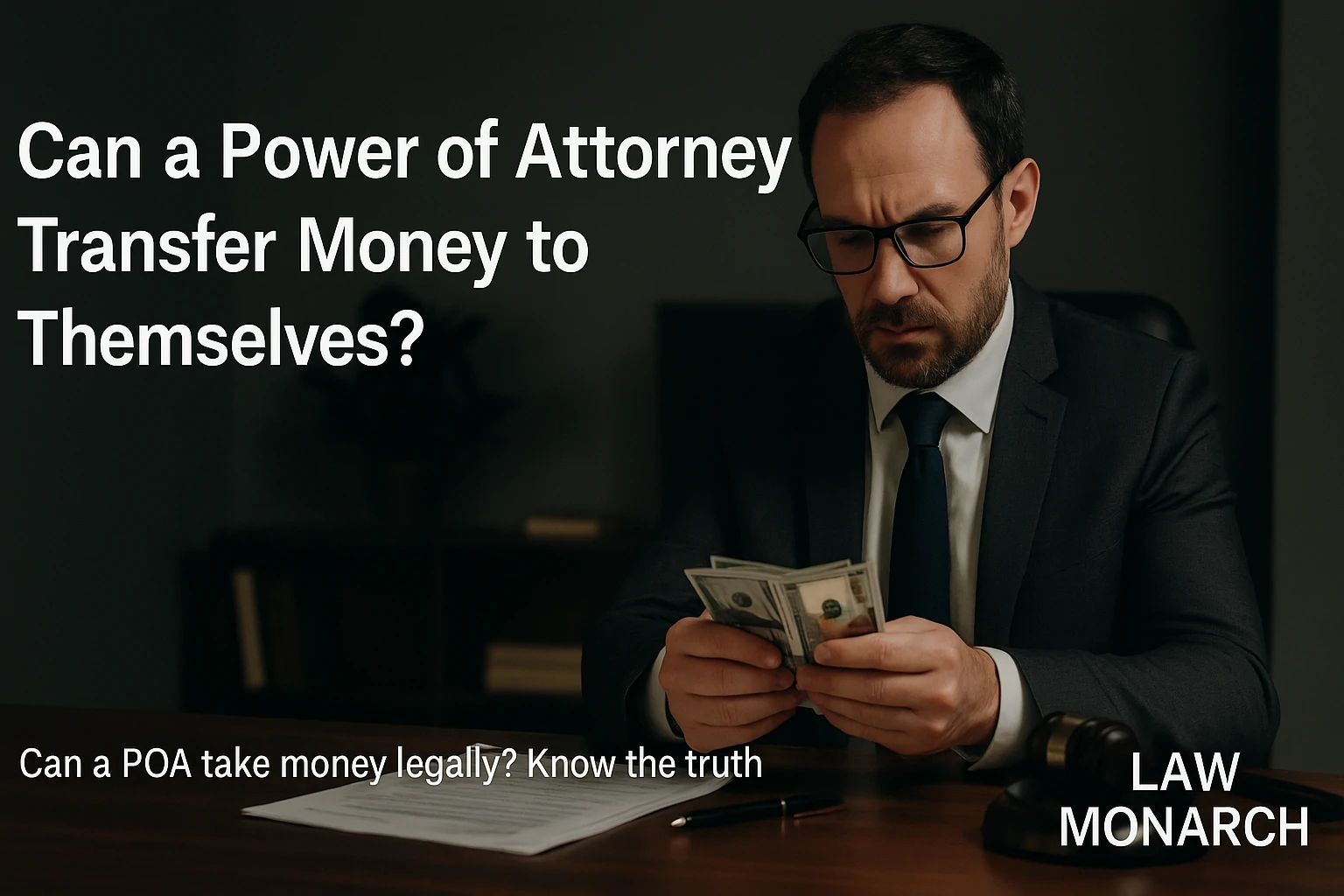A power of attorney gives someone legal control over another person’s affairs. This role often involves big decisions. One question causes confusion and concern, can that person take money for themselves?
Families create power of attorney documents to help during illness, age, or legal needs. The person named as power of attorney handles tasks like paying bills or managing bank accounts. This role must follow strict rules. It must protect the best interest of the person who gave that power.
When money enters the picture, trust can break. Loved ones may start asking questions. Someone might notice large bank withdrawals or transfers. These actions raise doubts. This article explains when a power of attorney can move money and what happens when they cross the line.
What a Power of Attorney Means in Simple Terms
A power of attorney is a legal form. It lets someone else act on your behalf. That person is the “agent.” The one who gives the power is the “principal.” Many people use this setup to handle finances, property, or health decisions.
The power given can be broad or narrow. Some agents take care of everything. Others handle only one task. In some cases, a person may even assign more than one agent, learn more in our guide on can you have 2 power of attorneys. A durable power of attorney stays active if the principal becomes sick or unable to act. That is often when the most serious issues arise.
The agent must always act in good faith. They must protect the principal’s money, home, and personal rights. They should not take advantage of the situation. The law watches this closely.
Can the Agent Transfer Money to Themselves?
This depends on what the document allows. If the power of attorney clearly states that the agent can move money to themselves, it may be legal. If not, such a transfer could break the law.
Even if the principal trusts the agent fully, that trust must appear in writing. A verbal agreement is not enough. Courts need written proof. Without it, the agent could face charges like theft, fraud, or elder abuse.
In some cases, agents move money because they pay out of their own pocket for expenses. If they buy medicine or cover rent, they can get reimbursed. But they must keep records. They must show receipts. They cannot take extra money as a gift or bonus unless the document allows it.
Real Risk of Misuse and Conflict
A power of attorney creates a strong legal bond. But it also invites trouble if not handled right. An agent who moves money for personal gain may not only lose the role but face legal action.
In many cases, family members start to notice strange activity. They may see new purchases, trips, or debts paid off that do not match the principal’s past spending. That triggers questions. It leads to court cases. Some families fall apart over these disputes.
The courts look at the timing of transfers, the size, and the reason. If an agent gave themselves a large sum just before the principal died, that causes alarm. Even small gifts can raise doubt. Without clear permission, the law sees it as abuse.
What the Law Says About Fiduciary Duty
Every agent under a power of attorney must follow something called fiduciary duty. That means they must act with care, honesty, and loyalty. They cannot put their own needs first.
If an agent uses their position for personal gain, they violate this duty. That is a serious breach. Courts do not take this lightly. Judges may order the agent to return the money or property. They may face charges. Their reputation may suffer forever.
Even if the agent believes they acted fairly, that belief must match the law. They must show proof. They must explain every dollar spent or moved.
When Transfers May Be Allowed
In rare cases, the power of attorney may allow some form of self-payment or gifting. These rules must appear in writing. They must follow the principal’s past behavior or wishes.
If the principal has always made small gifts to family or allowed payments for services, the court might accept similar actions by the agent. But this line is thin. Any change from past patterns will raise questions.
The agent must avoid anything that looks like self-dealing. They must not blend personal and principal accounts. They must not use vague reasons to explain large transfers. Everything must be clean, fair, and easy to track.
Who Can Stop Abuse or Misuse?
Family members often play the first role in noticing trouble. If they believe the agent crossed a line, they can go to court. They can ask for an investigation. They can report the case to adult protection services, law enforcement, or speak with a gang stalking attorney if they feel watched or harassed during the dispute.
Banks and financial advisors also watch for red flags. They may freeze accounts or report suspicious moves. They have a duty to protect their clients too.
The principal can also revoke the power of attorney, if they are still mentally able to do so. They must put it in writing and notify all banks, brokers, and other places where the agent had power.
How to Set Rules That Prevent Abuse
The best way to avoid confusion is to write a detailed power of attorney. It should state exactly what the agent can and cannot do. It should limit gifts. It should say if the agent will get paid or reimbursed.
Pick someone with a clear record. Avoid agents who have money problems or past fraud issues. Trust alone is not enough. Add checks and balances. Let another person review accounts. Share access with a lawyer or CPA. Keep things transparent.
Many families feel peace when the right person is in charge. But one mistake or bad act can ruin that trust. Once a dispute starts, it may not end easily. Lawsuits, stress, and lost money can all follow.
How Courts Handle These Cases
If the court finds that an agent took money without permission, it may void the power of attorney. The court may appoint someone else to handle affairs.
In some cases, judges order full repayment. The agent may lose property or savings. If the abuse involved a large amount or caused serious harm, jail time is possible.
Courts do not care if the agent meant well. They only care about what the document allows and what the law says. Good intent does not replace clear rules.
What Every Agent Should Remember
Act with care. Always document what you do. Keep records. Keep receipts. Ask questions when in doubt. Do not assume power means full control. You are not the owner. You are the helper. You serve someone else’s interest, not your own.
You are there to protect, not to profit. You are a guardian of someone’s life, money, and future. That is a serious role.
If you feel unclear about your rights or limits, speak to a lawyer. Do not guess. The cost of one mistake can be high.
Final Thoughts
A power of attorney can make life easier during hard times. But it must be used with respect and care. Taking money for yourself without clear approval can lead to deep trouble. Trust, once lost, may never return.
Each move an agent makes should reflect duty, not desire. If the law is not clear, the safest path is to pause and ask. Talk to the principal. Talk to a legal expert. Make sure your actions match their wishes and the law.
In the end, your role is not just legal, it is moral. Do it well, and you protect someone’s future. Cross the line, and you risk your own.
Read Also: Can You Have More Than One Power of Attorney?
FAQs
Can a power of attorney take money without permission?
The law does not allow a power of attorney to take money for personal use unless the document clearly gives that right. Every transfer must follow written rules. Courts treat unauthorized transfers as theft or financial abuse.
What happens if a power of attorney misuses money?
Courts may remove the agent and order them to repay the funds. Some cases lead to criminal charges. The agent could face fines, jail, or both. Even if the misuse seems small, the law takes it seriously.
Is it legal to pay yourself as power of attorney?
Some POA documents allow the agent to receive payment. The language must be clear. If the document says nothing about pay, the agent cannot take money without risking legal trouble.
How can family members stop power of attorney abuse?
Family members can report concerns to adult protective services, the police, or a lawyer. They can also ask the court to review the case. Quick action helps protect the principal’s money and rights.
Can a power of attorney write checks to themselves?
Only if the POA document allows it. Even then, the agent must have a valid reason, such as approved pay or repayment of personal funds used for the principal. All actions must follow clear legal rules.




